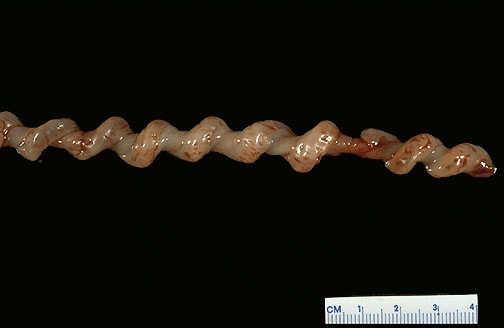And she was directed by the best of the best here in AZ.
I'm upset. I am most upset that doctors would get together, make a statement and policy and set it in force without any research to back up their theory. Yes, babys are born fine with knots present. Then again, babys are also born dead like that. Babys are born fine with cord torsion. Then again, some are born dead, and others suffer medical problems all their life, such as autism and cerebral palsy.
When a doctor tells me that the cord is fine, normal, when twisted or knoted, etc. I say, "Yes, the cord is fine. Until it's not. The baby is fine. Until that moment when there is blood constriction and he's dead."
I am under-educated, not medically qualified, and I feel helpless. I see the resistance from educated, qualified people to be open to new information or research about prenatal care. I wonder why... and in this I see human limitations and personality quirks. We are all resistant to change, aren't we?
At 22 weeks I told my doctor I am concerned about my low blood pressure because there is scant research linking it to stillbirths. She instantly dismissed it and said that she's sure the mother who loses her baby at night must also have genetic factors involoved, be laying on her back, or have some other complication that coincides with low blood pressure. Basically, I have never seen this study, so it's probably not true. There are other possible explanations so I am going to go with those.
I was, surprise, not satisfied! I said, "Unfortunately, there isn't research on this happening, so we have no way of knowing whether low blood pressure is or isn't a factor. Isn't is safer as a scientist to not assume it's wrong but instead wait for it to be disproved before you dismiss it?"
She smiled and sent me on my way, probably happy the annoying, paranoid mother was gone.
For thoughtful consideration, here is a small paragraph from one report published this year concerning the need to change prenatal care in regards to acknowleding that cord accidents may be measureable and preventable.
I especially like the end, which states that one COMMON prenatal practice has absolutely no standing, yet is commonly used.
(Emphasis added by myself)
Hypoactivity, decreased fetal movement, should be investigated with the objective to rule out umbilical cord entanglement and UCA especially in no risk patients with previous normal activity.[599-602] Decreased fetal movement that is sustained in early pregnancy (20wks-28wks) may indicate several fetal conditions. IUGR, Genetic Skeletal Muscle Disorder, Congenital Anomalies and or a fetal condition that “weakens the fetus”. Studies investigating fetal movement counting have been unable to show a definitive influence on outcomes.[599] The benefit of observing the fetus begins with the 18wk-20wk onset of movement detection by the mother. Fetuses change their movement pattern over time and become repetitive by 26wks-28wks. The initial investigation of fetal behavior should include questioning the mother at her prenatal visit about this detectable pattern. Studies have failed to look at the spectrum of fetal behavior and focused on one behavior of no fetal movement. No fetal movement is an alarm from the fetus to investigate the pregnancy immediately. Patients should be sent to the nearest obstetrical clinic or labor&delivery unit for evaluation. There are no studies to support recommending to a mother to put her feet up or drink fluids when there is a complaint of no fetal movement. Glucose ingestion and meals does not alter fetal behavior.[595],[603],[604],[605] The defining study on fetal behavior observation and outcomes in first time moms and previous stillbirth moms has not as yet been done. [143],[606],[607],[608],[609],[610],[611].
See www.preginst.com, Prenatal Umbilical Cord Project 2010, page 20


1 comment:
Wow - can't believe it's actually a policy not to tell patients their baby may have a life-threatening cord problem! Thanks for making a fuss about it! This really needs to change.
I'm praying your Trey has no such trouble. I know how much you need him! I'm trying desperately for a rainbow baby, too. By doing IVF. After two cord-related losses. While on unemployment. Yes, we're insane and desperate. And SCARED TO DEATH!
Post a Comment